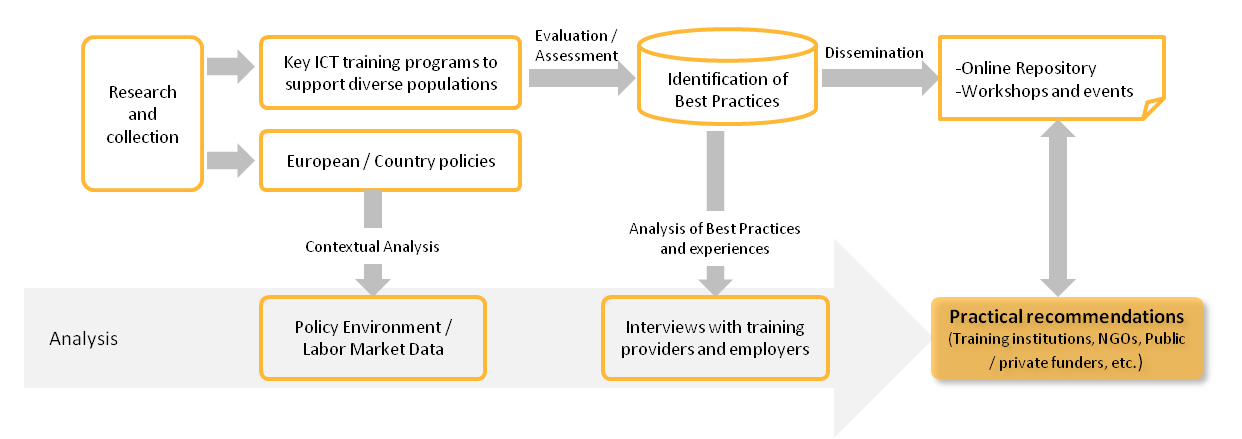______
The project is part of the JPMorgan Chase New Skills at Work program that aims to identify strategies and support solutions that help improve labour market infrastructure and develop the skilled workforce globally. This $250 million five-year global initiative, first launched in December 2013, brings together leading policymakers, academics, business leaders, educators, training providers and nonprofits with the goal of connecting labour market policy with practice, supply with demand and employers with the workforce. To learn more about the New Skills At Work initiative, please visit the link: https://www.jpmorganchase.com/corporate/Corporate-Responsibility/new-skills-at-work.htm
OBJECTIVE
______
The aim of this project is to identify and analyse effective ICT programs with a focus on diverse target groups, including women, vulnerable youth with low educational achievement or from difficult socio-economic backgrounds, migrants, unemployed adults changing careers. The work product shall inform policy development on the European and national level, and provide practical recommendations to non-profit organisations and training providers.
Recommendations will be addressed to policy makers throughout Europe and beyond, stakeholders representing different target groups and/or experienced in developing and offering suitable training and support programs.
The project will help training providers and stakeholders make progress towards achieving the vision of an inclusive smart society. It will identify effective best practice ICT training for diverse populations, make available better data on the effectiveness and success factors of training programs, create awareness for these factors and promote learning from best practice in the selected countries and at international level following a targeted dissemination strategy.
APPROACH
______
Main activities of the project:
- Comprehensive research for identification of national and regional ICT training programs to support diverse populations to enter the labour market in Germany, France, the United Kingdom, Ireland, Spain, Poland and South Africa. Research will tap information from academic publications, the national experts’ network, and the relevant websites. An initial assessment and evaluation of identified e-skills and ICT training programs will produce around 60-100 inclusive programs and initiatives, which will become part of a repository and undergo further analysis.
- Contextual analysis of country data and information to allow for a differentiated view of the labour markets and national policies including strengths and weaknesses, thus providing information with a potential of helping design better targeted training measures as well as pointing training providers to funding, support or orientation. Building on these analyses, recommendations will allow training providers and stakeholders to focus activities on the most promising approaches, highest impact, scalability and sustainability.
- Development of a methodology framework for the assessment and identification of best practices from the pool of initiatives identified. It will be based on performance indicators like 'target fit', 'policy fit', 'scope and continuity', 'maturity' and ‘Impact’. It is estimated that this process will result in a list of around 20-30 best practice programs and initiatives.
- Establishment of an online interactive repository of good practices of national ICT training programs to support diverse populations to enter the labour market. The aim is to present 60 - 100 good practices in a repository of searchable best practice descriptions by key words and free text search.
- Development of practical recommendations which will draw directly from the analysis of best practice in terms of effectiveness, efficiency and the related success factors with a view to mutual learning and emulation of success stories. Specific recommendations will be developed and addressed to policy makers and implementing organisations, to provide them with practical insights and strategies from successful cases.



